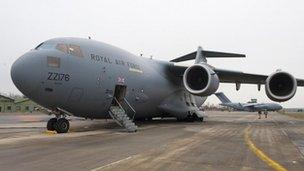Aid money could go to defence - David Cameron
- Published
- comments

The RAF's C-17 transporter plane can be used for combat, peacekeeping or humanitarian missions
The government is to consider spending money from the UK's £10bn aid budget on peacekeeping and other defence-related projects, David Cameron has said.
Such a move could see funds diverted from the Department for International Development to the Ministry of Defence.
The PM, who has been urged to cut aid spending by some Tories, said security and stability were often needed before development could take place.
Critics argue that aid money should not be used to compensate for defence cuts.
Mr Cameron has said he intends to protect all £10bn of Britain's aid budget, promising to spend 0.7% of national income on development.
But, speaking to reporters on his return journey from a trade visit to India, the prime minister said he was very open to the idea of the Department for International Development (DfID) sharing more of its money with the Ministry of Defence (MoD)
"DfID and the Foreign Office and the defence ministry work increasingly closely together," he said. "If you are asking me can they work even more closely together, can we make sure that the funds we have at our disposal are used to provide basic levels of stability and security in deeply broken and fragile states, then I think we should.
"That is an important part of development."
"We have our moral responsibilities for tackling poverty in the world. We also have national security responsibilities for mending conflict states and helping with development around the world and we should see DfID in that context," he added.
Officials said hundreds of millions of pounds could be diverted from aid to peacekeeping and stabilisation operations, particularly in fragile states.
A Downing Street source said one option under consideration was a significant increase in the size of the Conflict Pool - a fund jointly managed by the MoD, Foreign Office and DfID that supports conflict prevention, stabilisation and peacekeeping.
The money would not be used for combat missions or equipment and Downing Street insisted the plan would comply with international aid spending rules.
Conservative MP Colonel Bob Stewart said critics of the idea were "barking"
Defence Secretary Philip Hammond said it "made sense" to look at areas where defence supports international development "at a time when the defence budget is under pressure".
He said it was about using budgets "most effectively" and said proposals would be brought before the National Security Council before a decision was made.
BBC deputy political editor James Landale said this shift in priorities would go down well with Conservative MPs and voters who think it was wrong to increase aid while cutting defence.
The question now was what aid projects would be cut to pay for more security operations, he added.
Liberal Democrat chairman of the International Development Committee Sir Malcolm Bruce said switching funds from overseas aid to the defence budget would be "outrageous", adding: "You can't use the aid budget to make up for defence cuts."
For Labour, shadow international development secretary Ivan Lewis said he supported a "coordinated approach to tackling conflict" but said the "major proportion" of UK aid money should continue to be used to "alleviate poverty, improve basic services and support job creation".
"Cameron's attempt to suggest aid money can be used to offset deep defence cuts is misleading and will not stand up to scrutiny," he added.
Oxfam's head of policy Max Lawson told BBC Radio 4's Today programme "millions" supported the protection of the aid budget and the money should be spent on "hospitals and not helicopter gunships".
Liberal Democrat MP, Malcolm Bruce, said a major shift in the budget was "simply not possible"
"We cannot see any penny diverted into the military," he argued.
Charity Christian Aid said it was "deeply concerned" that the "blurring of the lines between military action and aid delivery" could put aid workers at risk.
But Tory MP Patrick Mercer, a former Army officer, said security and overseas aid were "inextricably linked".
"So much of the aid we have attempted to spend in the past in places like Iraq and Afghanistan has not been delivered as effectively as it might because of the lack of a benign security environment.
"If that means more money has to be spent on defence in order to increase the efficacy of overseas aid spending, I'm all for it."
- Published21 February 2013
- Published20 February 2013
- Published20 February 2013
- Published19 February 2013
- Published18 February 2013
- Published9 November 2012
- Published1 November 2012
- Published26 September 2012
- Published23 August 2012